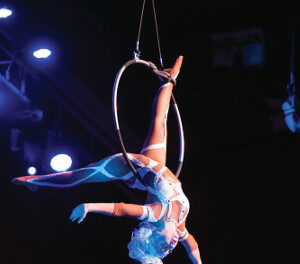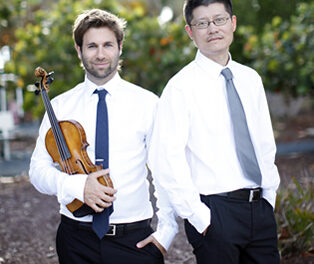After touring through California during what other students would consider their spring break, the Duke University Chorale and Duke Chorale Chamber Choir gave a rousing homecoming concert featuring some of the favorite repertoire of the semester. Rodney Wynkoop directed the ensemble in mostly sacred works, spanning from the Renaissance to today. The first half of the program was inspired by all religious texts, vacillating between traditional chant-style arrangements to contemporary reimagining of the same style, and even to a couple of rousing spirituals. The first half seemed to wear on the students, as they lost some energy by about the fifth song of the half – Z. Randall Stroope‘s “Lamentations of Jeremiah.” This cinematic, exciting piece was full of rhythmic passages and complex entrances that lost some steam until the final, powerful chords. These especially showed off a wide, glorious range among voice parts. Although the energy was a little inconsistent from beginning to end, the singers always remained poised and enthusiastic, backed by a palpable joy.
Wynkoop asked for a show of hands to demonstrate various statistics of the ensemble; how many members are seniors (a lot!), how many are vocal or music majors (only five!), how many are undergraduates (most, but surprisingly not all!). Interestingly, the majority of students that are in the ensemble sing because they love it. A particular moment that highlighted this joy was in the set of two oldest compositions of the night: “Ave Maria” by Josquin des Prez (c.1450), and “Jesu dulcis memoria” by Tomás Luis de Victoria (c.1540). “Ave Maria” was an unaccompanied, period-appropriate mass piece, with clear and precise ornamentation in the few places it was called for. Wynkoop’s obvious passion for historical context informed the chorale’s performance in their pure and unadorned tone, strength and balance of individual voice lines, and precise ornaments. “Jesu dulcis,” meanwhile, was directed by student conductor Qingyang Xu, to whom the chorale was incredibly responsive. Xu was demonstrative and obviously well-practiced, but also respected by her peers.
The half closed with, among more traditional choral works, a couple of soloists singing spirituals in old American folk styles. Leigh Joyner Wynkoop’s arrangement of “Deep River” featured Joseph Tan* delivering a powerful bass solo, and Katherine Waugh belted an amazing rendition of Henry Mollicone’s “Glory Day.”
The chorale’s smaller ensemble, the Duke Chorale Chamber Choir, opened the second half with unaccompanied contemporary songs. “Let My Love Be Heard” by Jake Runestad and “She Walks in Beauty” by Eric William Barnum were more complex but delightfully harmonious, playing to this elite group’s strengths of part individuality and perfect diction, which actually may have been too exaggerated as there was a collective smirk after ending a Barnum’s song with a rather explosive “t” sound. The chorale would later sing Dan Forrest‘s “Good Night, Dear Heart” from their places within the full ensemble. Forrest’s arrangement took the poem of Mark Twain in memory of his daughter and her untimely death; the performance was ethereal, plaintive, and positively tear-jerking. Pianist Mary Hamilton, who performed with the choir for a majority of the concert, was particularly sensitive and added sentimentality to this work. The Chamber Choir was able to maintain intonation through an impressively long stretch without accompaniment, allowing Hamilton to land gracefully back within their harmony when she re-entered.
The second half of the full ensemble’s performance was no less impressive, offering more variety after the predominantly sacred opening. To celebrate the centennial birthday of Leonard Bernstein, they performed “Life is Happiness Indeed” from Candide, adopting a delightful operatic timbre and sounding refreshed and energetic in this comedic work. Similarly, their performance of Donald Moore’s “One Minute Madrigal” was enthusiastic. They didn’t take themselves too seriously, and their English pronunciation, sometimes the downfall of a choir, was never lost.
More soloists emerged to deliver powerful phrases in “Remember,” an expressive work written in sonnet form by one of Wynkoop’s former classmates, Frank La Rocca. Kyle Gornick lent a sumptuous tenor, and Sharon Kinsella’s young, angelic soprano soared over an already powerfully wide range of notes.
The highlight of the evening, and appropriately placed as the finale, was of course Moses Hogan‘s arrangement of “Elijah Rock,” a popular choral spiritual that offers an incredible introduction by the male voices and low alto parts in rhythmic, chant-like ostinato. More and more parts joined into a complex, rollicking work. It was hard to tell what the singers enjoyed most about performing this song: the impressive, energetic song itself, or Wynkoop’s enthusiastic conducting that, intentionally or not, was strongly akin to “The Carlton” dance (made famous of course, by Alfonso Ribeiro in his performance as Carlton Banks on The Fresh Prince of Bel-Air, an important part of any millennial’s childhood).
While “Elijah Rock” was certainly enough to draw a standing ovation from an appreciative audience, the ensemble ended with two encore pieces that calmed things down but also stirred up nostalgia, especially for the alumni present. A 30-year tradition, the singing of “Danny Boy” was the penultimate performance of the work for many emotional seniors in the chorale; again this highlighted Wynkoop’s expert musical interpretation as well as the choir’s responsiveness and attention to details. The alumni were invited to join the choir onstage for the Duke University Alma Mater, affectionately known as “Dear Old Duke.” While this stung a little to hear as a defeated Tar Heels basketball fan, the singing was passionate and the performance endearing. The concert may have run a little longer than the choir’s pure energy could carry them, and it had several moments of questionable intonation, but overall this is a polished, professional group who obviously enjoy doing what they do.
*Edited, corrected 3/25/19.












